When it comes to digital marketing, two popular platforms that often come up in discussions are Semrush and Similarweb. Both offer valuable insights into website performance, competitor analysis, and SEO optimization, but they each have their unique strengths and approaches.
This puts you in a situation where you must determine which tool is better for your business. That’s why a side-by-side comparison is essential.
In this comprehensive comparison, we’ll dive deep into the features, pricing, and use cases of Semrush and Similarweb to help you determine which tool best suits your needs.
Semrush vs Similarweb: A Quick Comparison
Before we delve into the details, let’s take a quick look at how Semrush and Similarweb stack up against each other:
| Comparison Criteria | Semrush | SimilarWeb |
|---|---|---|
| Keyword Database | Over 26 billion keywords | 5 billion keywords |
| On-Page SEO Checker | Site audit, SEO content template, listing management, and many more | Site audit, website analysis |
| Content Marketing | AI-assisted tools like ImpactHero and ContentShake AI | Suggests trending topics and keywords |
| Website Audit | Data-driven site audit tool | In-depth Website audit |
| Free Trial | Exclusive 14-day free trial (for our readers) | 7-day free trial |
| Pricing | $139.95/month | $199/month |
Semrush vs Similarweb: Key Features Comparison
Let’s explore the key features of both platforms to understand their strengths and capabilities.
1. Keyword Research
Keyword research is the foundation of any successful SEO strategy. Both Semrush and Similarweb offer tools in this area, but with different approaches and strengths.
Semrush Keyword Research
Semrush provides a robust and comprehensive keyword research toolkit. At its core is the Keyword Magic Tool, which allows users to access a vast database of over 26 billion keywords.
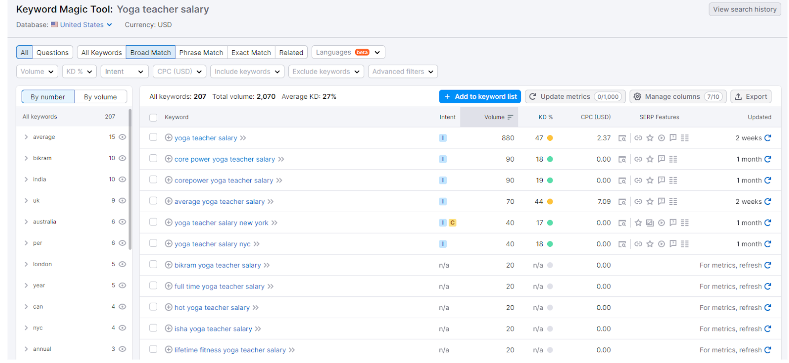
When you enter a seed keyword, the tool generates an extensive list of related keywords, complete with important metrics such as:
- Search volume: Monthly average searches for each keyword
- Keyword difficulty: An estimate of how hard it would be to rank for that keyword
- Cost per click (CPC): Average cost for paid ads targeting the keyword
- Competitive density: Level of competition for paid advertising
- SERP features: Special search result elements like featured snippets or local packs
Semrush also offers a Keyword Gap tool, allowing you to compare your keyword strategy against up to five competitors. This helps identify opportunities you might be missing. The Organic Traffic Insights feature combines your Google Analytics data with Semrush’s keyword database to reveal which keywords are driving traffic to your site, including those elusive “not provided” keywords.
Similarweb Keyword Research
Similarweb’s approach to keyword research is more focused on competitive intelligence. Their keyword tools include:
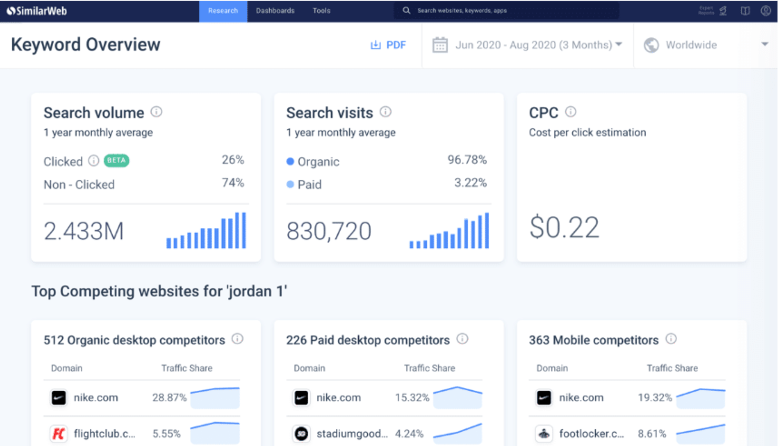
- Keyword Analysis: Discover keywords driving traffic to any website, including organic and paid keywords
- Similar Sites: Find websites in the same niche and analyze their keyword strategies
- Audience Interests: Understand what topics and keywords your target audience is interested in
While Similarweb doesn’t provide as much detail on individual keyword metrics like difficulty or SERP features, it excels at giving you a broad view of keyword performance across entire industries. You can see which keywords are trending in your niche and how different websites are capitalizing on them.
Verdict: For pure SEO-focused keyword research, Semrush offers more depth and variety in its tools. However, Similarweb provides valuable insights for understanding keyword trends and competitive landscapes across entire industries.
2. On-page And Technical SEO
On-page optimization and technical SEO are crucial for improving website performance and search engine rankings. The two platforms offer quite different capabilities in this area.
Semrush On-page and Technical SEO
Semrush provides a comprehensive suite of tools for on-page and technical SEO:
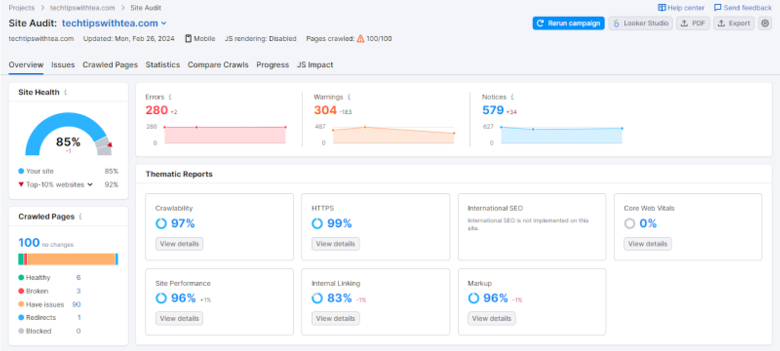
- Site Audit: This tool crawls your entire website, identifying over 140 technical and SEO issues. It categorizes problems by severity and provides actionable recommendations for fixing them. Issues covered include crawlability, indexability, HTTPS implementation, site speed, and more.
- On-Page SEO Checker: Analyzes your pages and provides suggestions for improvement based on top-ranking competitors. It covers aspects like content length, readability, keyword usage, and internal linking.
- Log File Analyzer: Helps you understand how search engines crawl your site by analyzing your server log files.
- Page Experience Report: Focuses on Core Web Vitals and other user experience signals that are important for Google rankings.
- Content Audit: Evaluates your existing content and helps identify pieces that need updating or removal.
Semrush also integrates these tools, allowing you to track your progress over time and prioritize the most impactful changes.
Similarweb On-page and Technical SEO:
Similarweb’s offerings in this area are much more limited. While it doesn’t provide dedicated tools for on-page or technical SEO, it does offer some relevant insights:
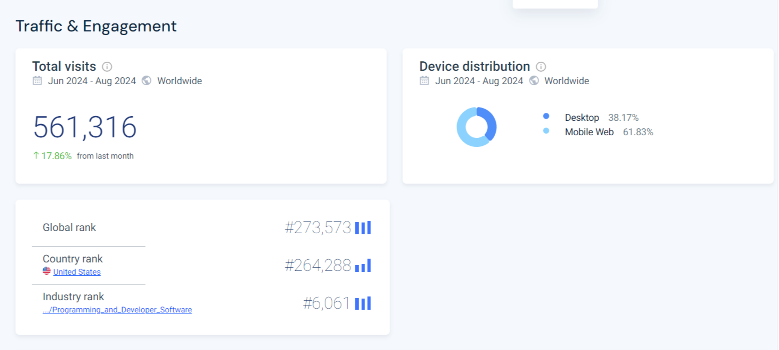
- Website Performance Analysis: Provides metrics on page load time and bounce rate, which can indicate technical issues.
- Content Analysis: Offers insights into the most popular pages and content types on a website, which can inform on-page optimization strategies.
- Traffic Sources: Helps you understand how users are finding and accessing your site, which can inform technical decisions like mobile optimization.
Verdict: Semrush is the clear winner in this category, offering a comprehensive set of tools specifically designed for on-page and technical SEO. Similarweb’s offerings are more tangential to this area, focusing more on overall site performance and content popularity.
3. Competitor Research
Understanding your competitors’ strategies is crucial for staying ahead in the digital landscape. Both Semrush and Similarweb offer strong capabilities in this area but with different focuses.
Semrush Competitor Research
Semrush provides a suite of tools designed to give you a 360-degree view of your competitors’ digital marketing strategies:
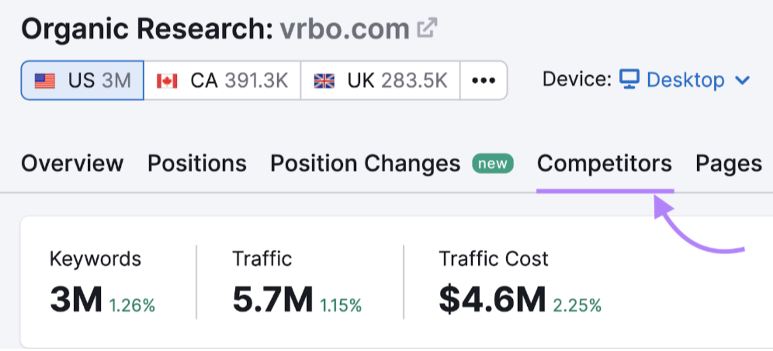
- Traffic Analytics: Estimates competitors’ website traffic, including sources, geographies, and devices. It also provides engagement metrics like visit duration and pages per visit.
- Organic Research: Shows which keywords your competitors are ranking for, their position changes over time, and estimated traffic from each keyword.
- Advertising Research: Reveals competitors’ paid search strategies, including their ad copy, landing pages, and keyword targets.
- Display Advertising: Analyzes competitors’ display ad campaigns, showing their ad creatives, publishers they’re working with, and estimated ad spend.
- Backlink Analytics: Provides a detailed view of competitors’ backlink profiles, helping you understand their link-building strategies.
- Market Explorer: Helps you identify your market players and analyze the competitive landscape in your industry.
Semrush also offers a Domain vs Domain tool, allowing you to compare up to five domains across various metrics directly.
Similarweb Competitor Research
Similarweb’s platform is built around competitive intelligence, offering robust tools for analyzing competitors:
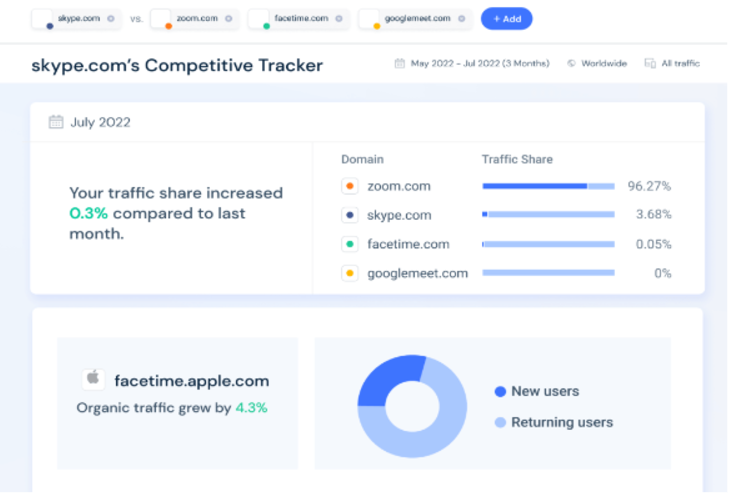
- Traffic Overview: Provides detailed estimates of competitors’ web traffic, including total visits, average visit duration, pages per visit, and bounce rate.
- Audience Analysis: Offers insights into competitors’ audience demographics, interests, and other websites they visit.
- Traffic Sources: Breaks down competitors’ traffic by channel (direct, referral, search, social, mail, and display ads).
- Keyword Analysis: Shows which keywords drive traffic to competitors’ sites, for both organic and paid search.
- Similar Sites: Helps you discover new competitors in your space based on audience overlap.
- Industry Analysis: Allows you to benchmark against industry averages and track market trends.
Similarweb’s strength lies in its ability to provide a high-level view of entire industries and markets, not just individual competitors.
Verdict: Both tools offer strong competitor research capabilities, but with different strengths. Semrush provides more detailed insights into competitors’ SEO and PPC strategies, while Similarweb excels in overall web traffic analysis and industry-wide benchmarking. The best choice depends on whether you’re more focused on search marketing specifically or broader market intelligence.
4. Backlinks
Backlink analysis is crucial for understanding a website’s authority and developing effective link-building strategies. Both tools offer backlink analysis features, but with varying depths and approaches.
Semrush Backlinks
Semrush boasts a massive backlink database of 43 trillion backlinks, providing comprehensive backlink analysis tools:

- Backlink Analytics: Offers a detailed overview of any domain’s backlink profile, including total backlinks, referring domains, follow vs. nofollow links, and anchor text distribution.
- Backlink Audit: Helps you analyze your own backlink profile, identifying potentially toxic links that could harm your SEO.
- Link Building Tool: Suggests link-building opportunities based on your competitors’ backlinks and your existing content.
- Bulk Analysis: Allows you to analyze multiple domains at once for quick competitor comparisons.
- Historical Data: Tracks changes in backlink profiles over time, helping you understand link-building trends.
- Backlink Gap: Compares your backlink profile against competitors to find link opportunities you’re missing.
Semrush also provides detailed metrics for each backlink, including InLink Rank (a measure of link authority) and estimated traffic.
Similarweb Backlinks
Similarweb’s backlink analysis is part of its broader competitive intelligence suite:
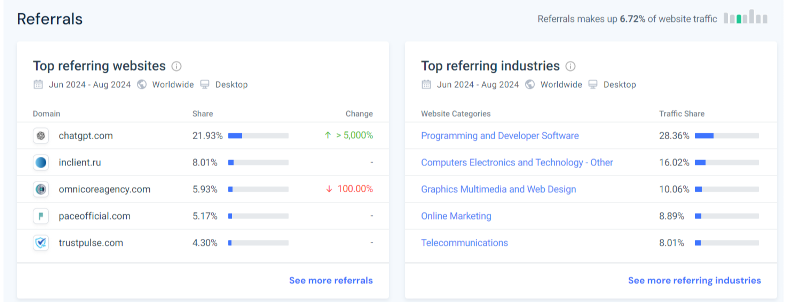
- Referral Sites: Shows top websites sending traffic to any domain, which often correlates with backlinks.
- Outgoing Links: Reveals which external sites a domain is linking to, helping you understand their link network.
- Similar Sites: While not directly related to backlinks, this feature can help you find potential link partners in your niche.
- Traffic Share by Channel: Includes a “Referrals” category, giving you an idea of how much traffic a site gets from backlinks.
While Similarweb provides valuable insights into traffic from referrals, it doesn’t offer the same depth of backlink-specific data as Semrush.
Verdict: Semrush is the clear winner for in-depth backlink analysis and link-building strategies. Its dedicated backlink tools and vast database make it ideal for SEO professionals focused on link building. Similarweb’s strengths lie more in overall traffic analysis, with backlink data being a component of that broader picture.
5. Website Audit
Regular website audits are essential for maintaining optimal site health and performance. The two platforms approach this task quite differently.
Semrush Website Audit
Semrush’s Site Audit tool is a comprehensive solution for technical SEO analysis:
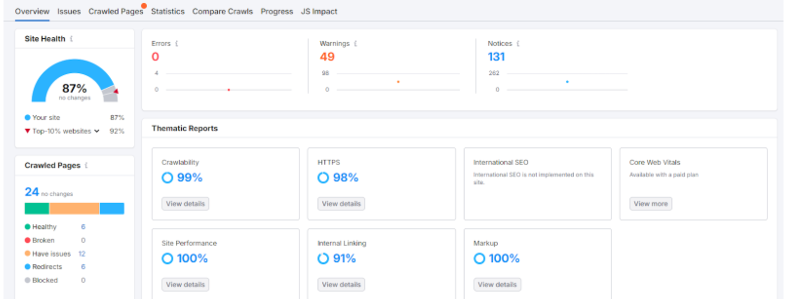
- Crawl Report: Scans your entire website, identifying over 140 types of technical and SEO issues.
- Issue Prioritization: Categorizes problems by severity (errors, warnings, notices) to help you focus on the most critical issues first.
- Visualization: Provides a site structure visualization to help you understand your site’s architecture.
- Page Speed Analysis: Integrates Core Web Vitals data to help you optimize site speed.
- Internal Linking: Analyzes your internal link structure and suggests improvements.
- Crawl Comparison: Allows you to compare audit results over time to track your progress.
- Custom Rules: Lets you set up your own rules for site audits based on your specific needs.
The tool also provides actionable recommendations for fixing identified issues and integrates with other Semrush tools for a comprehensive SEO workflow.
Similarweb Website Audit
Similarweb doesn’t offer a dedicated website audit tool in the traditional SEO sense. However, it provides various analytics that can be useful for overall website performance assessment:
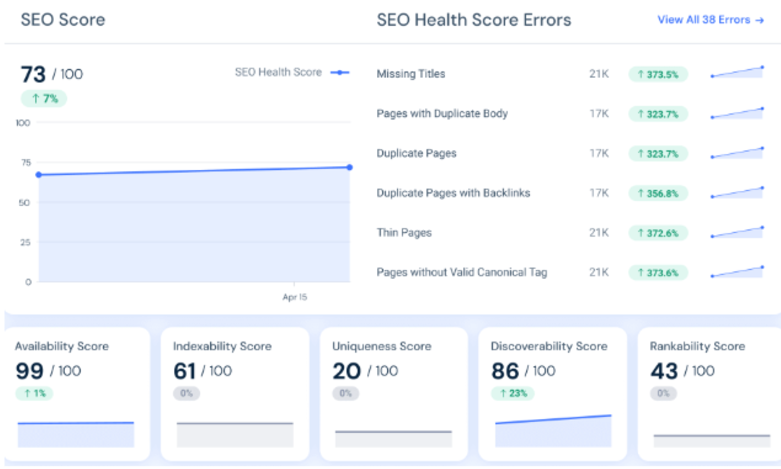
- Traffic Overview: Gives you a high-level view of your website’s performance, including total visits, average visit duration, pages per visit, and bounce rate.
- Audience Interests: Helps you understand if your site content aligns with your audience’s interests.
- Traffic Sources: Breaks down where your traffic is coming from, which can highlight areas for improvement.
- Popular Pages: Shows which pages on your site are performing best, potentially indicating areas of strong or weak content.
- Technology Stack: Provides information about the technologies used on your website.
While these insights can be valuable for overall strategy, they don’t provide the same level of technical SEO analysis as Semrush’s Site Audit tool.
Verdict: For comprehensive technical SEO audits, Semrush is the clear choice. Its Site Audit tool offers in-depth analysis and actionable recommendations specifically geared toward improving SEO performance. Similarweb’s strengths lie more in providing overall performance metrics and audience insights, which can complement technical audits but don’t replace them.
6. Content Marketing
Content marketing is a crucial component of digital marketing strategies. Both Semrush and Similarweb offer features to support content creation and optimization, but with different approaches and depths.
Semrush Content Marketing
Semrush provides a comprehensive suite of content marketing tools:
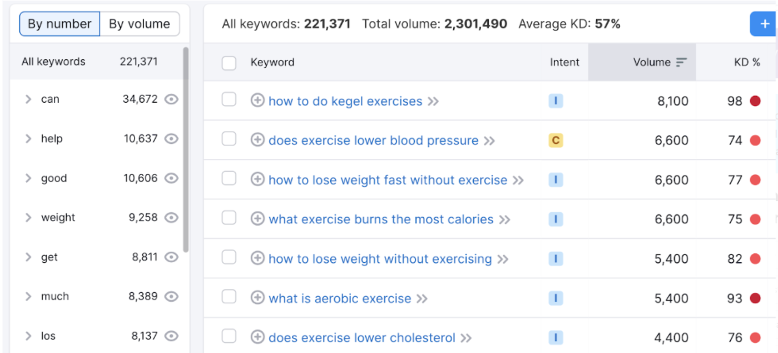
- Topic Research: This tool helps you discover popular topics in your niche. It provides an overview of headlines, questions, and related searches, helping you generate content ideas that resonate with your audience.
- SEO Content Template: After inputting your target keywords, this tool analyzes top-ranking pages and provides recommendations for content creation, including semantically related keywords, backlink targets, and ideal content length.
- SEO Writing Assistant: This real-time content optimization tool checks your content against SEO best practices, readability standards, tone of voice, and originality as you write.
- Content Audit: Analyzes your existing content, helping you identify pieces that need updating, removing, or rewriting based on their performance.
- Post Tracking: Monitors the performance of your published content, tracking rankings, social shares, and backlinks over time.
- Brand Monitoring: Tracks mentions of your brand across the web, helping you identify content opportunities and manage your online reputation.
Similarweb Content Marketing
Similarweb’s content marketing features are more limited but still offer valuable insights:
- Content Analysis: Provides data on the most popular content types and topics in your industry, helping you understand what resonates with your target audience.
- Audience Interests: Offers insights into the topics and categories that interest your audience, which can inform your content strategy.
- Traffic by Pages: Shows which pages on competitors’ sites attract the most traffic, giving you ideas for content that performs well in your niche.
- Keyword Analysis: While primarily an SEO tool, this can also help you identify topics and themes to cover in your content.
Verdict: Semrush offers a more comprehensive and specialized set of content marketing tools, making it the better choice for content-focused marketers. Similarweb provides valuable industry-wide insights that can inform content strategy, but lacks specific tools for content creation and optimization.
7. Social Media Marketing
Social media plays a crucial role in digital marketing, and both platforms offer some level of social media analysis and management.
Semrush Social Media Marketing
Semrush includes a Social Media Toolkit with several features:
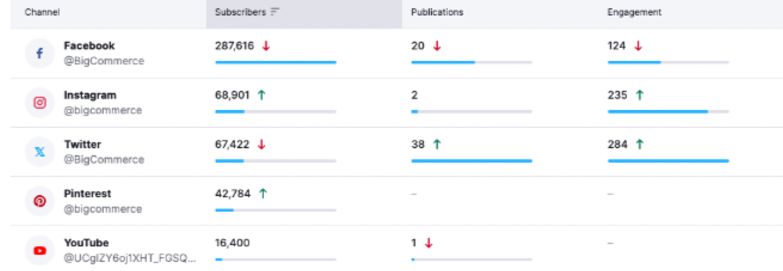
- Social Media Poster: Allows you to schedule and post content across multiple social platforms from a single dashboard.
- Social Media Tracker: Monitors your social media performance across various platforms, tracking followers, engagement, and audience growth.
- Social Media Ads: Helps you create and manage social media ad campaigns, with a focus on Facebook and Instagram ads.
- Competitive Analysis: Compares your social media performance against competitors, helping you benchmark your strategies.
- Content Ideas: Suggests trending topics and content ideas based on your industry and audience interests.
- Analytics and Reporting: Provides detailed reports on your social media performance, including engagement rates, best-performing posts, and audience demographics.
Similarweb Social Media Marketing
Similarweb’s social media features are more focused on analysis than management:
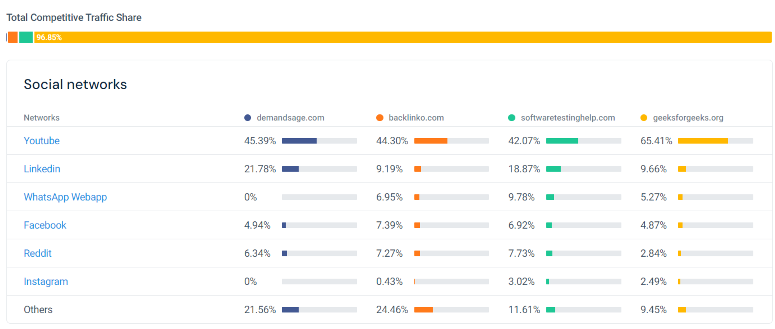
- Social Traffic Sources: Breaks down which social platforms drive the most traffic to websites in your industry.
- Audience Interests: Includes data on social media preferences of your target audience.
- Website Content Analysis: While not strictly a social media tool, this feature can help you identify content that’s likely to perform well on social platforms.
- Competitive Benchmarking: Allows you to compare social traffic performance against competitors and industry averages.
Verdict: Semrush provides a more comprehensive suite of social media marketing tools, including both management and analytics features. Similarweb’s offerings are limited to traffic analysis from social sources, making it more suitable for high-level strategy rather than day-to-day social media management.
8. Reports and Analytics
Effective reporting and analytics are crucial for understanding performance and making data-driven decisions. Both platforms offer robust reporting capabilities, but with different focuses.
Semrush Reports and Analytics
Semrush offers a wide range of customizable reports covering various aspects of digital marketing:
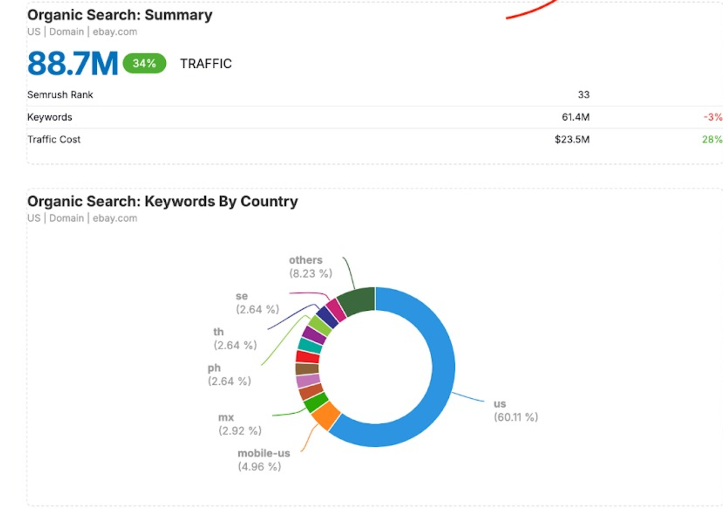
- My Reports: Allows you to create custom PDF reports combining data from multiple Semrush tools.
- Scheduled Reports: Automates report generation and delivery on a set schedule.
- White Label Reports: Enables you to create branded reports for clients or stakeholders.
- Data Visualization: Offers various chart types and data presentation options for clear communication of insights.
- API Access: Allows integration of Semrush data into your own analytics systems (available on higher-tier plans).
- Google Data Studio Integration: Enables creation of dynamic, real-time dashboards using Semrush data.
- Domain Analytics: Provides comprehensive reports on domain performance, including traffic, keywords, and backlinks.
Similarweb Reports and Analytics
Similarweb focuses on web traffic and market intelligence reporting:

- Industry Analysis: Offers reports on market trends, including top websites, rising stars, and audience interests within specific industries.
- Website Performance Reports: Provides detailed analytics on website traffic, including sources, geography, and user behavior.
- Audience Analysis: Generates reports on audience demographics, interests, and online behavior.
- Competitive Analysis: Creates side-by-side comparisons of your website against competitors across various metrics.
- Custom Reports: Allows you to build tailored reports focusing on specific metrics or websites of interest.
- Data Export: Enables export of data in various formats for further analysis or integration with other tools.
- API Access: Offers programmatic access to Similarweb data for integration into your own systems (on higher-tier plans).
Verdict: Both platforms offer strong reporting capabilities, but with different strengths. Semrush provides more SEO and digital marketing-focused reports, with a high degree of customization and integration with its various tools. Similarweb excels in providing broader market intelligence and competitive benchmarking reports. The best choice depends on whether you’re more focused on specific marketing channel performance or overall market trends and competitive positioning.
Semrush vs Similarweb: Pricing Comparison
Let’s compare the pricing structures of both platforms to understand the value they offer.
Semrush Pricing Plans
Semrush offers three main pricing plans to its users:
| Plan | Monthly Price | Annual Price (per month) |
|---|---|---|
| Pro | $140 | $117 |
| Guru | $250 | $208 |
| Business | $499.95 | $416.66 |
Semrush offers a 14-day free trial for new users to test the platform’s features. They also provide a 7-day money-back guarantee, allowing users to request a refund within the first week of their subscription if they’re not satisfied with the service.
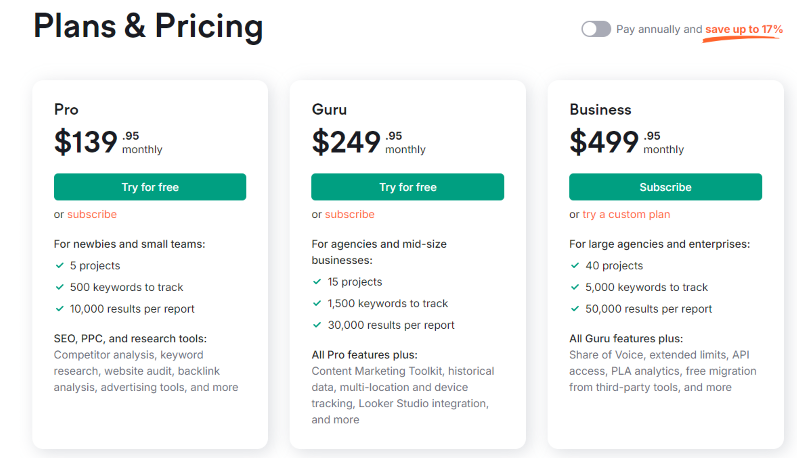
The Pro plan is suitable for freelancers and small teams, while the Guru plan offers additional features for growing agencies. The Business plan is designed for large agencies and enterprises requiring advanced features and higher limits.
Similarweb Pricing Plans
Similarweb offers two prepaid and two custom-tailored plans for small teams and enterprises:
| Plan | Monthly Price | Annual Price (Per Month) |
|---|---|---|
| Starter | $199.00 | $125 |
| Professional | $449.00 | $333 |
| Team & Enterprise | Custom pricing | Custom pricing |
Similarweb offers a 7-day free trial for their platform. However, they do not provide a refund policy, so users should carefully evaluate the tool during the trial period before committing to a paid plan.

The Starter plan offers basic web analytics features, while the Professional plan includes more advanced competitive intelligence tools. The Enterprise plan is customized for large organizations with specific needs.
Semrush vs Similarweb: Which One To Choose?
The choice between Semrush and Similarweb depends on your specific needs and focus areas.
Choose Semrush If:
- Your primary focus is on SEO and improving organic search performance
- You need comprehensive keyword research and tracking capabilities
- On-page and technical SEO optimization are crucial for your strategy
- You require in-depth backlink analysis and link-building tools
- Content marketing and optimization are key components of your digital marketing efforts
- You want an all-in-one platform for SEO, content, and social media marketing
Choose Similarweb if:
- Your main interest is in analyzing overall web traffic and market trends
- Competitive intelligence and benchmarking are your top priorities
- You need detailed insights into audience demographics and behavior
- Industry-wide analysis and discovering new market opportunities are important to you
- You want to focus on high-level strategic decisions based on web traffic patterns
- Your primary goal is to understand and compare website performance across various industries
Conclusion: Semrush Offers An All-in-one Marketing Solution, While Similarweb Is Limited To SEO
Both Semrush and Similarweb are powerful tools that offer valuable insights for digital marketers. Semrush stands out as a comprehensive SEO and digital marketing platform, providing a wide range of tools for keyword research, on-page optimization, content marketing, and more. It’s an excellent choice for businesses and marketers focused on improving their search engine rankings and overall online visibility.
Similarweb, on the other hand, excels in providing broad web analytics and competitive intelligence. It’s particularly useful for understanding market trends, analyzing competitor performance, and gaining insights into audience behavior across industries.
Consider taking advantage of the free trials offered by both platforms to test their features and see which one aligns best with your requirements. Remember that for many businesses, using a combination of tools might provide the most comprehensive insights and support for their digital marketing efforts.